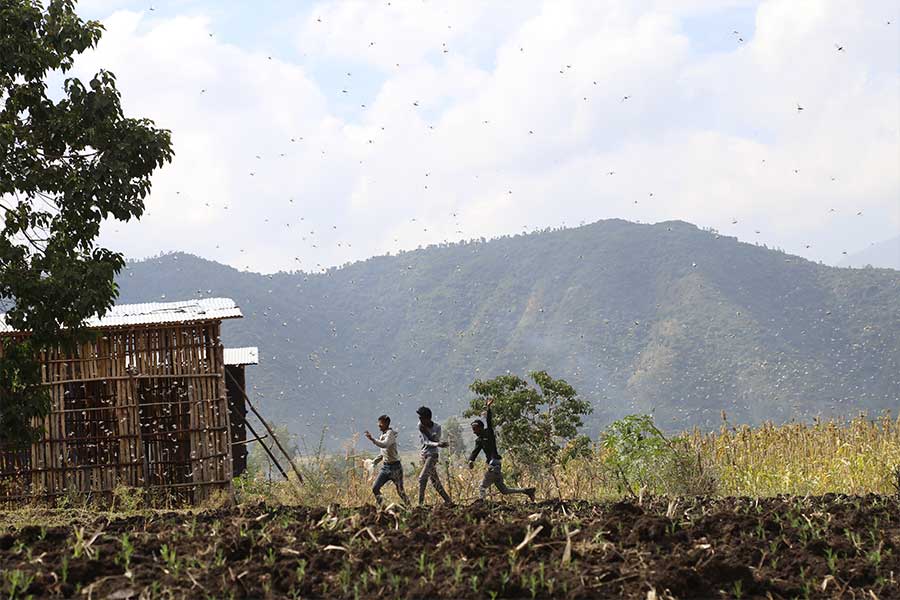
Life Matters | Jun 14,2025
Dec 25 , 2018
By Yonas Biru (PhD)
Yonas Biru (PhD) was the deputy global manager of the International Comparison Program at the World Bank. The opinions expressed here reflect his personal views and do not reflect that of any organisation. He can be reached at biruyonas@yahoo.com.
Preferential treatment in foreign aid is common. Favoured developing countries get more financial aid, preferential trade agreements and loan guarantees so they can borrow from international capital markets at lower rates. Many factors play in the decision-making process, chief among them geopolitical interest.
Contrary to popular opinion, the rise of Donald Trump to the presidency of the United States has proven to be a positive game changer for Africa. Driven by trivariate geopolitical interests to contain China's growing influence in Africa, arrest the flow of migrants and refugees to the US and Europe, and mitigate Africa's susceptibility as a breeding ground for international terrorism, the US and its allies are fundamentally reshaping the international development aid modality.
The speedy passage of the US Better Utilization of Investments Leading to Development (BUILD) Act of 2018 represents a cornerstone of the change. The Act incentivises flows of private capital to Africa to spur private sector-led economic growth and job creation and extends preferential trade agreements to African countries to boost their export earnings.
It also creates a new US International Development Finance Corporation (IDFC) as the successor to Overseas Private Investment Corporation (OPIC) and more than doubles its contingent liability ceiling to 60 billion dollars; relaxes restrictions on US direct investment, giving investors “preference” instead of making it a “requirement”; and imposes strong safeguards and sets strict rules for transparency, accountability and effectiveness.
The UK also aims to “boost trade between the UK and Africa,” with the aim of “making the UK the largest G7 investor in Africa by 2022.” The billions that Britain plans to invest will help "African economies grow by trillions," British Prime Minister Theresa May avowed.
It is hard to tell if it is by design or happenstance, but it appears that China spent billions building infrastructure in Africa as a foundation for economic growth, and the US and its European allies are moving in to reap the benefits and elbow China to the sidelines.
The shift in the axis of global geopolitics coupled with the changes in US and European international aid modalities are bound to reconfigure the contours of the international development space in two ways.
Primarily, the geopolitical realities of yester-century that were aimed at expanding global political influence will give way to a new paradigm of economic expansion, driven by multinational corporations (MNCs). This means US MNCs will be competing not only with China but also with those from Europe. Second, the World Bank and the African Development Bank-led government budget support programs will lose their muster, leaving them little room but to reinvent themselves. These are welcomed developments, which Ethiopia stands to gain from.
In November 2012, the World Bank noted that “Chinese Foreign Direct Investment (FDI) into Africa is on the rise and Ethiopia is at the forefront.”
In 2018, American and European FDI is set to rise, and Ethiopia is already at the forefront.
By many measures, Ethiopia has become one of the most geostrategic real estates in the world, thanks to its proximity to the Red Sea, a vital shipping and maritime route linking Europe and Asia and the strategic heartland of US energy security.
The question for Prime Minister Abiy Ahmed's (PhD) administration is thus, how can it leverage its geopolitical advantage to advance Ethiopia’s economic agenda without compromising its sovereignty?
Ethiopia can learn from South Korea, whose miraculous development and structural transformation from a subsistence agrarian society to an industrial powerhouse is due in part to the massive and sustained international aid it received.
A country that was outside of the US strategic sphere of interest found itself at the centre of the US concentric circle of strategic importance after the Second World War. Between the late 1940s and 1970s, it received 60 billion dollars in loans and grants from the US alone. This is equivalent to roughly 210 billion dollars in 2018 dollars - a huge sum as far as bilateral development aid goes.
Korea successfully leveraged its strategic position, undertaking a slew of fundamental reforms. One area that it never compromised on was its authorship and ownership of its development strategy.
Ethiopia’s case for a preferential treatment must start with a realistic development vision complete with well-established priorities, sound policies and clearly laid out implementation plans. The next challenge is to identify areas where additional US development support will have a bigger bang for its buck.
A diaspora proposal prepared to establish an Ethiopian Economic Advisory Council [which the author of this article co-authored] outlines what Ethiopia needs to do “to tackle its economic woes in all its dimensions.” This involves “building a critical mass of complementary reforms both in the private and public spaces to create an arc of collectively reinforcing externalities to spark transformative and sustainable progress.”
Ethiopia needs to overcome its obstacles and create new paths. On the economic sphere, its two most vexing problems are the lack of domestic development finance and its problem of raising international capital. The government needs a two-pronged approach.
Nationally, the root of the problem stems from poor financial regulations. The almost six-decade-old Commercial Code of Ethiopia is incompatible with the current globalised financial world. It is cumbersome, and some of its provisions repel rather than attract foreign investment. There is an urgent need for reforming the whole banking and financial system.
Internationally, traditional foreign aid regimes, including bilateral and multilateral grants, zero and low-interest loans, are woefully inadequate to dislodge Ethiopia’s economy from what economist Richard Nelson called a low-level equilibrium trap. Though not a panacea, the US BUILD Act has provisions that Ethiopia can leverage to make a case for more preferential treatment.
The three key areas of focus should be preferential loan guarantees; exemptions for special investment promotions for Ethiopian diaspora mutual funds, bonds and venture capital; and incentive mechanisms for American MNCs to invest in Ethiopia.
Preferential loan guarantees may be considered low hanging fruit since the BUILD Act has a provision to give loan guarantees to African countries. Loan guarantees mitigate the risk exposure that foreign investors undertake in countries they consider risky. Such guarantees have a significant multiplier effect in increasing foreign capital.
Recently, the US’ Millennium Challenge Corporation (MCC) selected Ethiopia as eligible to develop a threshold program, opening the door for substantial MCC financial support. Ethiopia should actively lobby for more support.
Exemptions for diaspora investment can potentially bring enormous resources to Ethiopia. Over five billion dollars in remittances were gained in the 2017/18 fiscal year.
As noted by the USAID and Migration Policy Institute report, “remittances represent only a fraction of the potential financial flows originating from" the diaspora.
Currently, the Ethiopian Diaspora Trust Fund initiative is mobilising resources, focusing on philanthropic donations. The Ethiopian diaspora also contributes through investments in enterprises and real estate.
The challenge is to broaden the diaspora’s investment opportunities. That is where substantial resources can be mobilised. In the US, mobilising diaspora mutual funds, purchasing diaspora bonds or setting up diaspora venture capital have stringent rules and regulations. Though the rules are designed to protect investors from unmitigated risks, they deprive countries such as Ethiopia significant diaspora capital.
Assume that the Ethiopian government announces to privatise 49pc of the Ethiopian Airlines, and members of the Ethiopian diaspora decided to set up an investment group in the US to mobilise pools of diaspora investors for collective investment to buy 20pc of the shares. Right off the bat, the group will face insurmountable regulatory problems.
Under the US federal securities law, a company may not offer stocks or bonds unless the offering has been registered with the US Securities & Exchange Commission or an exemption from registration is granted. Since the Ethiopian Airlines is not a publicly-traded company, the offering cannot be registered.
Furthermore, acquiring exemption is not a viable option because non-registered stocks and bonds are sold primarily to accredited investors. An overwhelming majority of Ethiopian diaspora does not meet the minimum income or wealth criterion.
This is an area where Ethiopia may collaborate with other African nations to lobby the US Congress and the White House, since such exemptions require an act of Congress and the President’s approval. Africa stands a better-than-half chance of having such a law pass under the Trump administration.
In parallel, the Ethiopian government should come up with targeted investment opportunities along with incentive packages to catalyse investment by the large diaspora community.
Additional resource could be mobilised through tax exemptions. Developing countries that are interested in luring FDI often provide tax incentives to buttress their business case. Though this helps create jobs in the economy, it deprives poor African countries of badly needed tax revenues.
In an article titled “Missing Africa: Should U.S. International Tax Rules Accommodate Investment in Developing Countries,” Karen Brown (Prof.) advocated for shifting the tax incentive burden to the US. She proposed a tax exemption system in which income derived from investment in Sub-Saharan nations is free of US income taxation for a decade to 15 years.
This can bring substantial US capital to Ethiopia.
Ethiopia is at a turning point. While tackling its pressing challenges, it must find ways to formulate a vision fueled by a higher dream of creating an innovation test bed to modernise its economic and social institutions. It can turn its dream into a reality by leveraging its geostrategic advantage and mobilising national and international resources.
The “Land of 13 Months of Sunshine,” and now “Land of Origins,“ can learn a lot from Korea, the ''Land of Morning Calm.”
PUBLISHED ON
Dec 25,2018 [ VOL
19 , NO
974]


Life Matters | Jun 14,2025

My Opinion | Mar 20,2021

Radar | Dec 10,2022

Radar | Jul 03,2021

Radar | Aug 01,2020

Radar | Jul 08,2023

My Opinion | Jan 31,2021

Radar | Aug 08,2020

Commentaries | Dec 28,2019

View From Arada | Dec 26,2020

Photo Gallery | 178426 Views | May 06,2019

Photo Gallery | 168626 Views | Apr 26,2019

Photo Gallery | 159428 Views | Oct 06,2021

My Opinion | 137072 Views | Aug 14,2021
Commentaries | Oct 25,2025

Dec 22 , 2024 . By TIZITA SHEWAFERAW
Charged with transforming colossal state-owned enterprises into modern and competitiv...

Aug 18 , 2024 . By AKSAH ITALO
Although predictable Yonas Zerihun's job in the ride-hailing service is not immune to...

Jul 28 , 2024 . By TIZITA SHEWAFERAW
Unhabitual, perhaps too many, Samuel Gebreyohannes, 38, used to occasionally enjoy a couple of beers at breakfast. However, he recently swit...

Jul 13 , 2024 . By AKSAH ITALO
Investors who rely on tractors, trucks, and field vehicles for commuting, transporting commodities, and f...

Oct 25 , 2025
The regulatory machinery is on overdrive. In only two years, no fewer than 35 new pro...

Oct 18 , 2025
The political establishment, notably the ruling party and its top brass, has become p...

Oct 11 , 2025
Ladislas Farago, a roving Associated Press (AP) correspondent, arrived in Ethiopia in...

Oct 4 , 2025
Eyob Tekalegn (PhD) had been in the Governor's chair for only weeks when, on Septembe...

Oct 25 , 2025 . By YITBAREK GETACHEW
Officials of the Addis Abeba's Education Bureau have embarked on an ambitious experim...

Oct 26 , 2025 . By YITBAREK GETACHEW
The federal government is making a landmark shift in its investment incentive regime...

Oct 29 , 2025 . By NAHOM AYELE
The National Bank of Ethiopia (NBE) is preparing to issue a directive that will funda...

Oct 26 , 2025 . By SURAFEL MULUGETA
A community of booksellers shadowing the Ethiopian National Theatre has been jolted b...